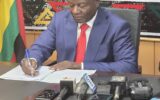
By Nqobizitha Dumakude Khumalo
OPINION – Love him or loathe him, Sengezo Tshabangu is a political figure who cannot be ignored. He has become a central figure in Zimbabwe’s opposition politics, though often judged solely through the lens of his detractors. Few have sought to understand his motivations or appreciate the context of his actions.
Many believe the narrative that Tshabangu emerged from obscurity, unknown to Nelson Chamisa and the mainstream opposition. This could not be further from the truth.
Tshabangu is a seasoned cadre in opposition politics. He was an early member of the Movement for Democratic Change (MDC) and rose through the provincial ranks. When the MDC split in 2013, he joined the Tendai Biti-led faction, eventually becoming Deputy National Organising Secretary. After another split in the People’s Democratic Party (PDP), he remained with the faction led by Lucia Matibenga. I served with him in that executive as Deputy National Spokesperson, while he was elevated to National Organising Secretary.
In the run-up to the 2018 elections, the PDP aligned with Joice Mujuru’s People’s Rainbow Coalition (PRC), and Tshabangu campaigned tirelessly for Mujuru. Following the coalition’s electoral defeat, many members lost morale and drifted away. Tshabangu, along with Promise Mlalazi and Alderman Hlalo, moved to Chamisa’s camp.
Tshabangu remained engaged and vocal within the opposition, especially in the lead-up to the 2023 elections. He openly criticised the imposition of candidates from outside Bulawayo, highlighting longstanding grievances that many chose to ignore. These tensions, sowed before the election, would later germinate into open revolt.
Tshabangu is not alone in his discontent. Many were disillusioned by Chamisa’s leadership style and his so-called “Strategic Ambiguity,” which some now view as little more than an “Ambiguous Strategy.” While some opponents quietly exited the political scene, others, like Biti, left noisily. A number have even crossed over to ZANU-PF. Tshabangu, however, chose a different route.
It is no secret that Chamisa’s leadership alienated many party stalwarts. A new clique emerged—favoured insiders replaced experienced cadres. Honest observers acknowledge that this was widespread. I personally witnessed similar developments in Epworth during the 2022 by-elections, particularly in the controversial imposition of Zivai Mhetu, who had reportedly bought his way into candidacy under Mwonzora’s MDC-T.
Mhetu, originally from Marondera, lost badly in Epworth. Blaming his defeat on Mwonzora’s party rather than his own popularity, he promptly crossed over to Chamisa’s CCC, once again allegedly leveraging financial resources to secure his position. Local favourites like Batanai Masunda were sidelined, highlighting the corrosive effect of money and poor strategy in internal party politics.
The situation in Epworth South was equally telling. Triple candidacy split the opposition vote, allowing ZANU-PF’s Taedzwa Mutana to win. Combined, the CCC votes exceeded Mutana’s tally. These outcomes angered many local residents, creating what one might call “silent Tshabangus”—disillusioned supporters quietly nursing their grievances.
The core issue remains: how many were alienated by the so-called Ambiguous Strategy? Instead of addressing systemic flaws, many in the CCC prefer to target the symptom—Tshabangu—while ignoring the cause.
Tshabangu, arguably acting out of legitimate frustration, is vilified, while others who made similar political manoeuvres are praised. Consider Robert Mugabe’s endorsement of Chamisa in 2018, which was welcomed despite Mugabe’s long history of authoritarian rule. Similarly, after her loss to Mwonzora, Thokozani Khupe—once Chamisa’s fiercest rival—crossed over to CCC and was awarded a senatorial seat.
If Tshabangu is to be dismissed as a ZANU-PF mole, what then of Mugabe and Khupe? Disgruntlement is not unique to Tshabangu—it is systemic.
It’s worth noting that the opposition’s biggest legal weakness lies not only in the judiciary’s alleged bias but also in its own courtroom performance. Many opposition lawyers argue in the press, not in court. This was evident during Chamisa’s 2018 legal challenge and again when CCC MPs took Tshabangu to court. Their case was weak and poorly argued.
I recall reading Jonathan Moyo’s analysis before the judgement—it raised valid legal concerns, casting doubt on the CCC’s prospects. Most critics of the ruling have not engaged with such analyses; instead, they rely on political rhetoric to discredit court decisions. For a party that purports to uphold constitutionalism and the rule of law, this contradiction is glaring.
Tshabangu may be unpopular—even within ZANU-PF circles—but his actions carry important lessons for all political parties in Zimbabwe:
- Never Take Supporters for Granted
Some leaders mistakenly view their supporters as passive followers. This assumption is especially dangerous for opposition movements, which pride themselves on being intellectual and progressive.
- Never Take Popularity for Granted
Zimbabwean politics is deeply personality-driven. Leaders are often idolised, but when decisions based on personality override democratic processes, internal dissent becomes inevitable. Tshabangu is one such product of that dissent.
- A Party Must Have an Ideology
Opposition parties should stand for more than just removing ZANU-PF. Lack of ideological coherence has led to political opportunism—individuals jump from one party to another without consequence. Without ideological grounding, loyalty becomes transactional.
- Respect Internal Structures
People value what they help build. A party must have strong, inclusive structures that make it difficult for external or internal sabotage. ZANU-PF invests in ideological education and internal cohesion. Other parties would do well to emulate that.
- Have and Respect Foundational Documents
A clear constitution and internal governance framework are essential. Tshabangu exploited CCC’s lack of formal structures and documentation. This vulnerability should serve as a warning.
- Conduct Credible Internal Elections
Fair primaries are critical. The imposition of candidates undermines legitimacy and demoralises grassroots supporters. Poor internal democracy is the soil in which Tshabangus thrive.
- Embrace Introspection
Parties must continuously assess themselves. Are we always right? Is everyone else always wrong? A political organisation that resists introspection becomes brittle—and eventually breaks.
Tshabangu may lack widespread popularity, and perhaps he could have communicated his motives more effectively. But he did raise valid concerns—particularly regarding candidate imposition in Bulawayo. Many of the recalled MPs were imposed and widely unpopular. Tshabangu could have built greater legitimacy by leaning into that reality.
Ultimately, history tends to judge political figures more fairly with time. Today’s pariahs may become tomorrow’s prophets. Tshabangu, like many others before him, may be remembered less harshly by future generations. Political discourse will mature, and the binary lens of hero versus villain may give way to more nuanced assessments.
There are lessons here—for every party, for every leader. We ignore them at our peril.







